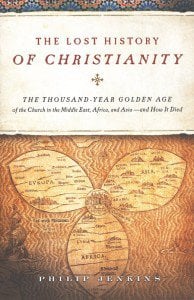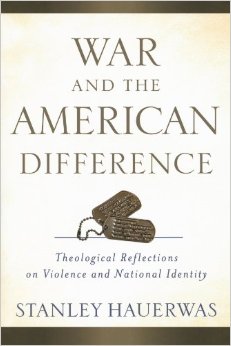
I remember the days when First Things was riding high as the representative of a robust ecumenical orthodoxy that believed it could fill up the butt-naked public square. It’s the place where I got my first taste of a public theological education. That period now does seem a little overly optimistic, but the journal still remains the publication of note when it comes to religion in public life.
This is why what I have to say about the past is important for the future.
I’m presently reading a book by the journal’s former chief editor entitled An Anxious Age. I’ve gotten through most of the first half that explains how the left-liberal knee-jerk activism of our time has its roots in the Calvinist genteel tradition of times past. Santayana famously summarized the genteel tradition as the attitude: “that sin exists, that sin is punished, and that it is beautiful that sin should exist to be punished.”
I’m about thirty to forty pages away from Bottum finishing his spanking of the post-Protestants. I’m curious to see whether he’ll be as deliciously sarcastic about the Catholics. As a longtime contributor to First Things and sometime editor of the journal (his abrupt departure is still shrouded in secrecy) Bottum might either treat the Catholics more lightly, or totally let go of the rails. I really do hope it is the latter.
Before I finish An Anxious Age I can only give an account of what I think the criticisms of Neo-Conservative Catholicism ought to be. That way I can later compare my notes with Bottum’s notes. The ammunition I needed came yesterday with the online publication of the piece “A Line Crossed in the Middle East” by Mark Movsesian.
The Movsesian details the history of Christians in the Middle East:
“By last week, most Christians in Mosul had already taken a fourth option—evacuation. Their departure marks the end of a continuous Christian tradition in Mosul. For thousands of years, Mosul has been a center for Christians, particularly for Assyrians, an ethnic group that predates the Arab conquest of Mesopotamia. Indeed, the ancient Assyrian capital of Nineveh, where the Prophet Jonah preached, lies across the Tigris River. Christianized in apostolic times, Assyrians have divided over the centuries into a number of communions that reflect the history of the religion: the Assyrian Church of the East, a small body, historically associated with Nestorianism, which once spread as far as China; the Syriac Orthodox Church, a member of the Oriental Orthodox family; and the Chaldean-rite Catholic Church, in communion with Rome. A small number of Assyrian Protestant churches exist as well, the legacy of nineteenth-century American missionaries.
As recently as a decade ago, tens of thousands of Christians lived in Mosul, some of them descendants of victims of the genocide the Ottoman Empire perpetrated against Assyrians, as well as Armenians and Greeks, during World War I. After this weekend, virtually none remain. On Saturday, ISIS expelled the fifty-two Christian families still in the city, after first requiring them to leave behind all their valuables. For good measure, ISIS also burned an 1800-year-old church and the Catholic bishop’s residence, along with its library and manuscript collection.”

These are the bare bones of the history. There were actually major centers of Christianity in both North Africa and the Middle East–regions presently exclusively associated with Islam. These regions were eventually decimated by the rise of Islam and its clashes with the West and Byzantium. What we are seeing today is not the beginning of the end for this region’s Christianity. It’s more like the end of the end. Philip Jenkins offers a more detailed account of this story in his The Lost History of Christianity: The Thousand-Year Golden Age of the Church in the Middle East, Africa, and Asia.
Given how, according to Jenkins, it was the combination of Islamic power and Western incursion that first destroyed this Christian civilization, it’s appropriate that Movsesian goes into a repentant tone toward the end of his piece:
“But the United States bears some responsibility as well. Its invasion of, and subsequent withdrawal from, Iraq set in motion a chain of events that has allowed radical groups like ISIS to succeed. Having intervened in the country, the United States had an obligation to take reasonable steps to prevent disaster from occurring. For Iraq’s Christians, American intervention has been an unmitigated disaster.”
A friend of mine suggested that a deeper question needs to be asked, “How much responsibility does First Things bear for this debacle?”
If you’ve been reading FT long enough then you’ll recall all the symposia on “Just War,” which increasingly became showcases for Weigel’s and Novak’s brand of American preemptive interventionism. Their calls to arms brazenly went against John Paul II’s unequivocal opposition to both our adventures in the Middle East.
John Paul was truly unequivocal in his opposition. So much so that in 2004, when Bush was visiting the Vatican, John Paul II reminded him of what he thought about Gulf War II:
“You are very familiar with the unequivocal position of the Holy See in this regard, expressed in numerous documents, through direct and indirect contacts, and in the many diplomatic efforts which have been made since you visited me, first at Castelgandolfo on 23 July 2001, and again in this Apostolic Palace on 28 May 2002.”
Neither Bush listened to the pope (Bush, Sr. similarly brushed off direct calls for peace before the First Gulf War). They did seem to listen to Novak, Weigel, and to a slightly lesser extent to Neuhaus.
Just as a reminder, here is Weigel at his most presumptuous in a pompously titled piece “Moral Clarity in a Time of War“:

“As for rogue states developing or deploying weapons of mass destruction, a developed just war tradition would recognize that here, too, last resort cannot be understood mathematically, as the terminal point of a lengthy series of nonmilitary alternatives. Can we not say that last resort has been satisfied in those cases when a rogue state has made plain, by its conduct, that it holds international law in contempt and that no diplomatic solution to the threat it poses is likely, and when it can be demonstrated that the threat the rogue state poses is intensifying? I think we can. Indeed, I think we must.”
What’s become apparent is how much the presumption for force ultimately failed to take a very complex situation into consideration.
As I remember it, sometime in 2003 or 2004 Paul Griffiths and Stanley Hauerwas (author of the no-holds-barred War and the American Difference: Reflections on Violence and National Identity) made a great mess on the op-ed pages of the journal because of their support for John Paul II’s presumption against war. Hauerwas even eventually quit the journal’s board over this.
The Christians of the Middle East are now paying the price.
But they’re not the only ones paying the price, because Neo-Conservatism also has a monopoly upon the anti-abortion position, which continues to lose its luster as it is associated exclusively with that political group.
I think First Things Catholics ought to use this period to reflect upon how they can do a better job of acknowledging the interconnectedness and moral complexity of issues in both times of war and peace.
If they only did that a decade or two ago and listened to the criticisms of the man who helped Weigel research for Witness to Hope, my friend the Polish philosopher Karol Tarnowski (for those of you who can read Polish here are his thoughts in ZNAK), then things would look much different now.
But we’ll never know.












